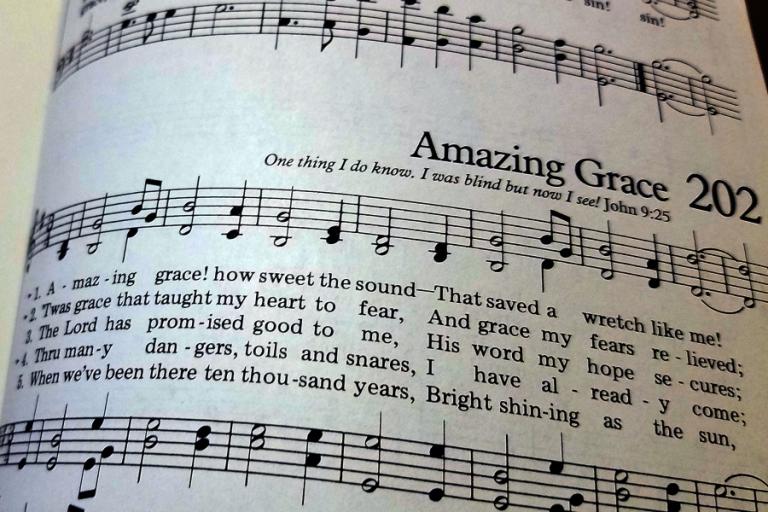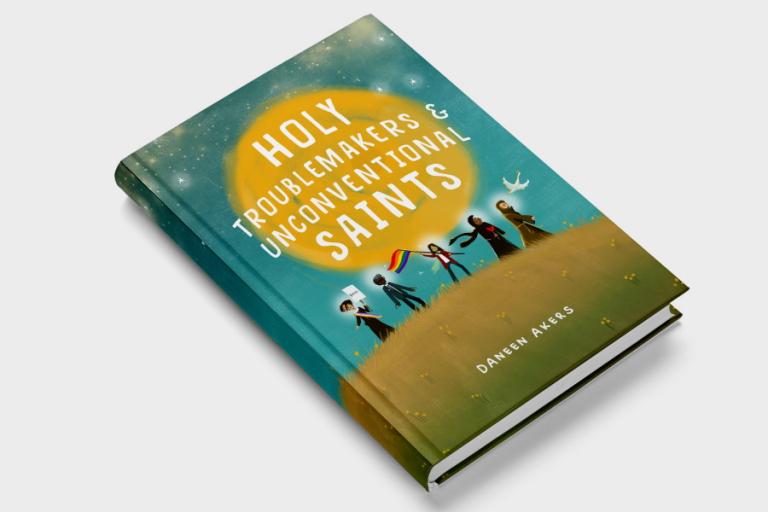
I recently asked, “What Hymns Still Work for You as a Progressive Christian?” And the response was amazing! Y’all came out of the woodwork to let me know what hymns you love. (And on the whole, it seems we progressive Christians do still love our hymns!) Since I received so much feedback (roughly 750 nominations that I counted), I figured I should tally them up and share the most popular examples, with a bit of brief commentary on each.
I should clarify that these findings are in no way scientific. The Patheos Progressive Christian audience obviously doesn’t represent all progressive Christians. And while I counted all the responses I could find from the blog-post comments, various Facebook shares, and Twitter posts, I’m sure some people responded in other places that I did not see. In a few instances where hymns received the same number of nominations, I used my own discretion for their specific ranking.
Still, I found these results to be really interesting, and I hope you do as well. Some of these hymns were expected, and some were rather surprising. A few were entirely new to me. I discovered that the familiarity of a hymn often seems to overrule the content of the lyrics (and that’s okay!). Some of these are still filled with bad theology, yet we can’t help but love them anyway.
With that, here are the 25 most popular hymns among the progressive Christians who responded.
#25: “O, the Deep, Deep Love of Jesus”
Back in my fundie days, I thought this hymn emphasized love just a bit too much, so I naively wrote an additional verse on “the deep, deep wrath of Jesus,” thinking I would balance it out. It was atrocious on every level. Well, it turns out love needs no counterbalance, and today, this 1875 hymn by Samuel Trevor Francis is among my favorites.
#24: “Fairest Lord Jesus”
Written in German in the 17th century and translated to English by Joseph A. Seissin in 1873, this hymn speaks of the beauty of creation and elevates Jesus as fairer still.
#23: “The Love of God”
Frederick M. Lehman wrote this hymn in 1917. The third verse is said to have been based on the “Haddamut,” a Jewish poem written in Aramaic in 1050 by Meir Ben Isaac Nehorai. In my opinion, that stanza contains some of the most beautiful lines ever written.
#22: “I’ll Fly Away”
I’m surprised to find this song so popular among progressive Christians, as it represents quintessential escapism—abandoning this world to reach heavenly bliss. But Albert E. Brumley’s 1929 hymn is a catchy, feel-good tune, and who can resist it when David Crowder and his glorious beard throw a hoedown?
#21: “They’ll Know We Are Christians by Our Love”
In many ways, this recent hymn serves as an anthem for what progressive Christianity represents. Inspired by Jesus’ prayer in John 13, it was written in the 60’s by Peter Scholtes, who worked with Dr. Martin Luther King Jr. during the civil rights movement.
#20: “Love Divine, All Loves Excelling”
Quite a number of Charles Wesley’s hymns would fit in well here (I’m quite fond of his “Hark How All the Welkin Rings” myself), and this one from 1747 serves as a beautiful example. We progressives are often chastised for overemphasizing God’s love, but tell that to the guy who wrote, “Jesus, Thou art all compassion; pure unbounded love Thou art.”
#19: “Here I Am Lord”
This one was new to me. It was written by Dan Schutte, and it premiered in 1979. Inspired by Isaiah 6 and 1 Samuel 3, this hymn alternates perspective between God’s call and our response.
#18: “Canticle of the Turning”
Copyrighted in 1990, this newest song in the list was was written by Rory Cooney. I had not previously heard of this one either, but I can easily see why it is a favorite. The hymn speaks of God’s mercy, of God’s justice, and of how God liberates the poor from their oppressors. I found verse three to be particularly relevant in this age of Donald Trump.
#17: “Joyful, Joyful, We Adore Thee”
Also known as “The Hymn of Joy,” this hymn was written by Henry van Dyke in 1907 and is set to the tune of Beethoven’s “Ode to Joy.” It emphasizes the beauty of creation and our call to live in love.
#16: “Holy, Holy, Holy”
Reginald Heber wrote this hymn in 1826 for use on Trinity Sunday. Aside from one disparaging comment about “sinful man,” it contains fairly little that is objectionable.
#15: “What a Friend We Have in Jesus”
Written by Joseph Medlicott Scriven in 1855, this hymn speaks of how we may bring our troubles to Jesus, who bears them with us.
#14: “All Creatures of Our God and King”
Saint Francis of Assisi wrote this hymn around 1225, and William H. Draper translated it into English in 1919. Although Draper’s is the most well-known translation (and beautiful in its own right), it is not the most literal. Francis’ original text speaks not only of Mother Earth, but of Brother Sun, Sister Moon, Brothers Wind and Air, Sister Water, Brother Fire, and Sister Death, all of whom offer their praise to God.
#13: “Just as I Am”
To be honest, this hymn leaves a bad taste in my mouth, as I associate it directly with the interminable altar calls of my upbringing. And the lyrics paint a rather pessimistic view of humanity. Nonetheless, it remains quite popular with progressive Christians. Charlotte Elliott wrote it in 1835.
#12: “This Is My Father’s World”
Maltbie Davenport Babcock’s 1901 hymn contains some of the best creation theology I’ve come across in hymnody. Far from the escapism so rampant in many hymns (see “I’ll Fly Away” above), it emphasizes God’s unwillingness to give up on this good creation. The earth is our home, and it always will be. We will not leave earth for heaven, but heaven and earth will be one. The song has been criticized, however, for its strictly masculine portrayal of God.
#11: “The Old Rugged Cross”
George Bennard wrote this hymn in 1912. Although it can easily come across as promoting penal substitution, it can also be read from a more cruciform perspective, emphasizing how God redeemed for good this human instrument of torture. As an interesting side note, the towns of Albion, Michigan; Pokagon, Michigan; and Sturgeon Bay, Wisconsin, all claim to be the birthplace of this hymn.
#10: “Morning Has Broken”
Like so many others on the list, this 1931 hymn by Eleanor Farjeon looks to the beauty of creation in praise of God.
#9: “Let There Be Peace On Earth”
Jill Jackson-Miller and Sy Miller wrote this song in 1955. It’s the final one from this list that was new to me, but I’m not surprised to see it here. Its call to a worldwide peace that begins with each individual clearly resonates with the progressive Christian message.
#8: “Come Thou Fount of Every Blessing”
My wife and I had this hymn sung at our wedding. It does contain a smattering of objectionable theology, but it’s so beautiful it’s hard not to love. Robert Robinson wrote it in 1757 at age 22 after converting to Methodism. He later became a Congregationalist, and then a Baptist, and later still a Unitarian—although he maintained his belief in the deity of Christ. Robinson’s own life can thus be seen to mirror the journey of deconstruction on which many of us modern progressive Christians find ourselves.
#7: “For the Beauty of the Earth”
Written by Folliott S. Pierpoint in 1864, this was intended as a Eucharistic hymn. In order to make it more generally applicable, the original refrain, “Christ, our God, to Thee we raise, This our Sacrifice of Praise,” was changed to what has now become more common, “Lord of all, to Thee we raise, This our hymn of grateful praise.” This is yet another hymn pointing to the beauty of creation, along with many other gifts we have been given, and praising God for it.
#6: “Great Is Thy Faithfulness”
Thomas O. Chisholm wrote this hymn in 1923, and it speaks of God’s “great faithfulness, mercy and love.” I find myself returning to it frequently.
#5: “In the Garden”
I’ve never really cared for this one myself, but it is obviously quite popular. Some who commented on my previous post described how they came to experience the hymn in a mystical sense. C. Austin Miles wrote it in 1912.
#4: “It Is Well with My Soul”
I have mixed feelings about this hymn. I’m sure you’ve all heard the story about how Horatio Spafford wrote these words in 1873 while aboard a ship near the same waters where all four of his daughters had died a few weeks earlier. In as much as it simply reflects his personal experience of peace, that’s fine. But I fear that the hymn, when sung communally, implies that such a reaction is somehow the better or more holy response to loss. To this I must strongly object. It is equally holy (and overall more biblical) to protest such loss in rage and anger. We would have far fewer psalms if that were not the case.
At the same time, I want to acknowledge how progressive the Spaffords themselves were. Horatio and his wife Anna left the institutional church to start a simpler gathering that they believed was more faithful. They were entirely egalitarian, with women serving in equal leadership positions with men. They rejected the infernalist view of hell, believing instead that God would eventually reconcile all people. And the colony they founded in Jerusalem did some tremendous interfaith work with Jews and Muslims.
Unfortunately, they were also rather apocalyptic dispensationalists, who fell into the same date-setting game as so many others in their day, believing they would not die before Christ returned. They were sorely disappointed, after assembling one day on Mount Olivet, when the clouds did not roll back as a scroll, the trump did not resound, and the Lord did not descend, as they had been expecting.
#3: “Be Thou My Vision”
This is quite possibly my own favorite hymn of all time. Traditional authorship ascribes it to Saint Dallán Forgaill in the 6th century, but modern historians believe it more likely originated between 950 and 1100. In either case, it is the oldest hymn to find its way onto this list. The few minor objections I might raise regarding its lyrics have more to do with Eleanor Hull’s 1912 translation than with the original Old Irish text.
#2: “How Great Thou Art”
Carl Boberg wrote this hymn in Swedish in 1885. Stuart K. Hine’s 1949 English translation is the most common version, but it also has a fair amount of problematic theology. The third verse in his version comes awfully close to penal substitutionary atonement, and the final verse is pure escapism. That said, the original text is not quite as problematic, and alternate translations exist that are much better.
#1: “Amazing Grace”
There was no competition here. John Newton’s 1779 hymn, favorite among Christians of all stripes, is unmistakably the most popular hymn among progressive Christians as well. I wasn’t really expecting this when I called it out in my previous post for its problematic lyrics regarding mankind’s wretchedness. I received a lot of pushback for that, equating the line with Newton’s own experience rather than a universal statement, but I still feel that this is what the song implies, even if not stated explicitly. In any case, that doesn’t keep the hymn from being incredibly beautiful, and there’s no question as to just how popular it has become.
Honorable Mention: “There’s a Wideness in God’s Mercy”
This hymn barely missed the top 25, but it’s so good I wanted to mention it anyway. Written by Frederick W. Faber in 1854, it speaks of how “the love of God is broader than the measure of our mind,” and it laments how “we make His love too narrow by false limits of our own.” Kurt Willems has described it as “If ‘Love Wins’ were a hymn.”












